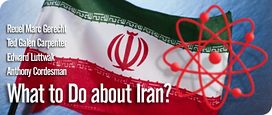Lead Essay
In this month’s lead essay, American Enterprise Institute resident fellow Reuel Marc Gerecht argues that American and European diplomacy aimed at derailing the Iranian clerical regime’s quest for nuclear weapons is, for various reasons, bound to fail. Gerecht maintains that we are then left to with two unattractive alternatives. “Is it better to preventively bomb the clerics’ nuclear facilities, or allow the mullahs to have nuclear weapons?” he asks. Arguing that the latter option “would empower its worst enemies in Tehran and spiritually invigorate all Muslim radicals who live on American weakness,” Gerecht advises the former: a policy of preemptively bombing Iran’s nuclear sites.
Response Essays
Cato vice president for defense and foreign policy studies Ted Galen Carpenter argues Gerecht’s strategy of bombing Iranian nuclear facilities may be harder than advertised and that “thousands of innocent Iranians would perish in U.S. air strikes.” Such an attack might trigger a “massive regional crisis.” “America’s troubles with the Islamic world do not yet constitute a war of civilizations,” Carpenter writes, “but Gerecht’s strategy could well produce that result.” Carpenter argues the U.S. should try to persuade Iran to give up its nuke program by offering a “grand bargain,” and if that doesn’t work, should pursue a policy of containment and deterrence, which, while “nerve-wracking,” has proved effective against deadlier and more fanatical regimes.
In his reply to Reuel Marc Gerecht’s lead essay, Anthony H. Cordesman, Arleigh A. Burke Chair in Strategy at the Center for Strategic and International Studies, argues the U.S. must exhaust all its diplomatic options before taking military action against Iran, especially given the shaky situations in Iraq and Afghanistan. In any case, Cordesman argues, airstrikes are unlikely to be succeed in stopping the Iran from developing nuclear weapons. Further, Iran already has lethal chemical and biological capacities, and the ability to strike back seriously in a variety of ways. If a strike becomes necessary after the exhaustion of non-military options, it would be better to wait until the targets are clearer. Containment and deterrence, Cordesman maintains, may be a more effective approach.
Center for Strategic and International Studies senior advisor Edward N. Luttwak argues that if diplomatic efforts fail, “the United States must be ready to bomb the buildings that are likely to house critical processes and equipment.” This can be a single quick strike, and need not destroy all the many Iranian facilities, Luttwak argues, because “the purpose is not to solve the problem presented by Iran or even its nuclear program, but only to delay the acquisition of nuclear weapons as long as possible, in the hopes that a better regime comes along.” The Iranians can get nukes no sooner than three years, though, so within that time the U.S. should concentrate on weakening the Iranian regime through non-military punitive measures. Furthemore, Luttwak maintains that Iran could fragment along national lines. “There are at least 20 million Azeris in Western Iran who are increasingly determined to assert their nationality,” Luttwak say, and U.S. policy aimed at weakening Iran should support them.

